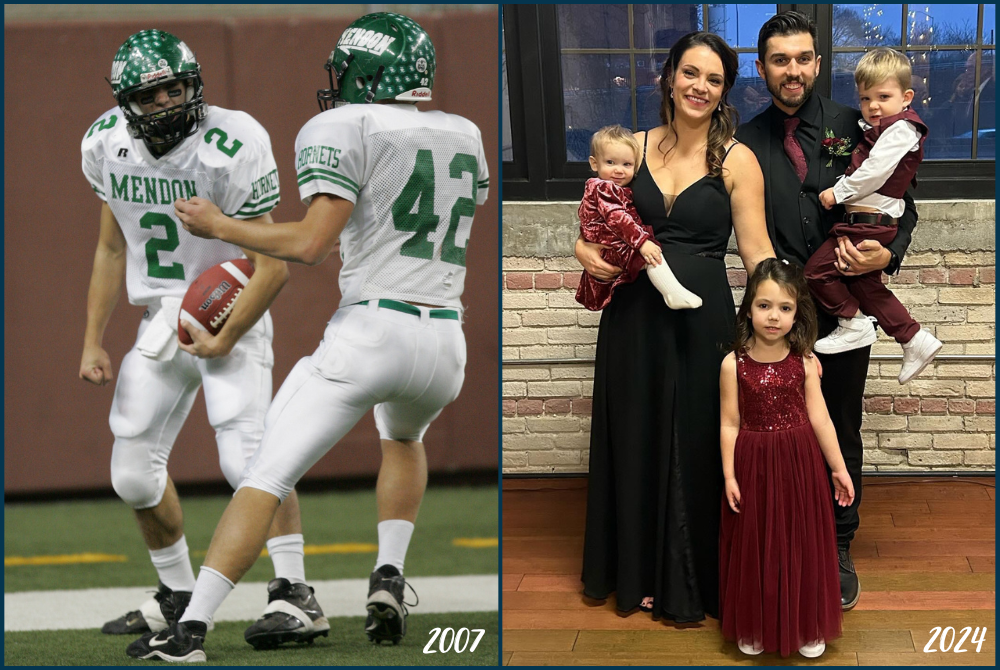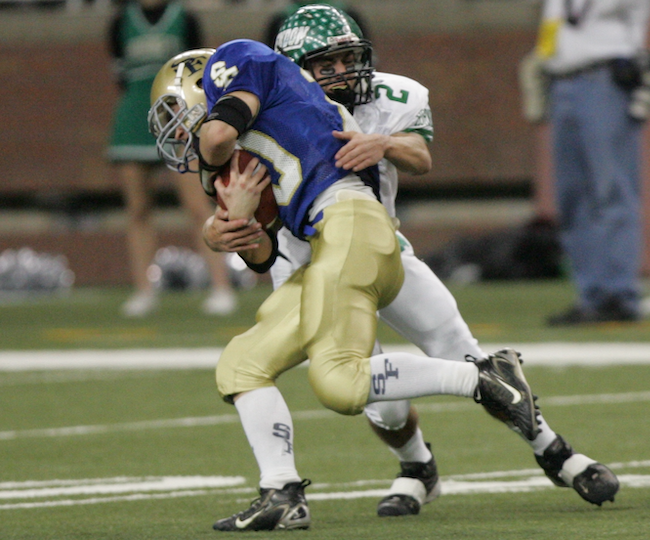
Working Through Transfer Trends
December 2, 2015
By Jack Roberts
MHSAA Executive Director
One of the responsibilities that schools have asked organizations like the MHSAA to execute is the management of transfer student eligibility. Historically, many associations have linked eligibility to residence ... thus, for some the regulation has been called the “Residency Rule” or “Transfer/Residency Rule,” not merely the “Transfer Rule.”
Over the years, as society became more mobile and families less stable, these rules became more and more complicated; and now, for most state high school associations, this is the regulation that consumes the most (or second) most pages of their handbooks. Over the years, this has also been the regulation most frequently challenged in court.
Over the years, some states have relaxed their transfer rule and others have refined their transfer rule. In either case, the transfer rule remains an imperfect rule, an imperfect net. Sometimes this net snags students who should not be made ineligible, and for those situations all associations have arranged some kind of waiver or appeal process.
And sometimes, and much less easily solved, the net fails to catch the situations it really should ... the transfers that are not hardship related or the result of some very compelling educational need, but those that are obviously for athletic reasons. It is those that we have been most focused on in Michigan.
Our first effort to get at the most problematic transfers was the adoption for the 1997-98 school year of what we called the “Athletic-MOTIVATED Transfer Rule” ... Regulation I, Section 9(E). Examples of an athletic-motivated transfer are included in the rule. The rule only applies to transfer students who do NOT meet any of the stated exceptions for immediate eligibility and are ineligible for one semester under our basic transfer rule. They become ineligible for 180 scheduled school days if there is a finding that the transfer was more for athletics than any other compelling reason.
This effort has not been successful enough because it requires a school that loses a student to another school to promptly allege to the MHSAA office, with supporting documentation, that the transfer was more for athletic reasons than any other compelling reason. The receiving school then must respond to those allegations. Then the executive director makes the decision. The unfortunate result of applying this rule is that it usually causes hard feelings between the schools, and hard feelings toward the executive director by the school decided against. In 17 years, schools have invoked this rule only 45 times.
Our more recent effort to address the most egregious athletic transfers resulted from requests from the coaches associations for wrestling and basketball, which were watching too many students change schools for athletic reasons, usually related to an out-of-season coaching relationship. The new rule – the “Athletic-RELATED Transfer Rule” – is Regulation I, Section 9(F). The difference between Section 9(E) and the newer Section 9(F) is that in 9(F) one school does not have to make and document allegations before staff can act. If MHSAA staff discover or are informed of any of the circumstances listed in 9(F), we can act. Again, the rule only applies to those transfer students whose circumstances do NOT meet one of the automatic exceptions. It applies only to students who are ineligible for a semester under the basic transfer rule. If there is a finding that one of the athletic related “links” exists (usually an out-of-season coaching relationship), then this transfer student who would be ineligible for one semester is made ineligible for 180 scheduled school days.
So far, it appears that 9(F) may be a better deterrent than 9(E). It has been referenced when students are rumored to be transferring, and it has stopped many of those transfers before they occur. We expect 9(F) to be an even better deterrent in 2015-16 because the rule has been broadened to apply to administrators and parents (not just coaches) and to address directing and coordinating athletic activities (not just coaching).
We have said that if this latest effort does not succeed in slowing athletic transfers, then the next step is 180 days of ineligibility – at least in any sport the student played in high school previously – for all transfer students who do not qualify for an exception that permits immediate play. I fear that would catch far too many students who should not be withheld so long from competition and could lead to a period like the early 1980s when the MHSAA, at the request of the state principals association, adopted the core of the transfer rule we have today and which resulted in a period of busiest litigation for the MHSAA when, at one time, the association had more than a dozen cases in court simultaneously on transfer matters. We’ve got to make the current rules work – with tweaks, perhaps; but not with radical revision.

Nightingale Embarking on 1st Season as College Football Head Coach
By
Scott Hassinger
Special for MHSAA.com
July 10, 2024
CJ Nightingale's family values, small-town upbringing and Christian faith steered the Mendon native into a career coaching college football.
 Nightingale, a 2010 Mendon High School graduate, is busily preparing for his first season as Belhaven University's eighth football coach. He was officially named the Blazers' head coach seven months ago, on Jan. 1.
Nightingale, a 2010 Mendon High School graduate, is busily preparing for his first season as Belhaven University's eighth football coach. He was officially named the Blazers' head coach seven months ago, on Jan. 1.
Belhaven, a Division III school located in Jackson, Mississippi, competes in the USA South Athletic Conference.
Nightingale credits his love of coaching to his father Chris Nightingale and grandfather Charles Nightingale.
"It all started with my dad and grandfather. At one time they were both involved in coaching, and their general love for sports wore off on me," CJ Nightingale said.
Once CJ reached high school, his interest in athletics only intensified thanks to several people who made a big impact on him.
"I had the most wonderful experience attending school and participating in Mendon athletics,” Nightingale said. “We didn't always have the better athletes, but we were successful because of all the time and commitment put in by our coaches, teachers, administration along with parental and community support. Success is the result of many people who focus on the same cause."
Nightingale lettered in football, basketball and baseball at Mendon, earning four varsity letters in all three sports. He was named the St. Joseph Valley League's MVP in all three sports his senior year, and Mendon earned league titles in all three during Nightingale's senior year as well.
As a starting quarterback and defensive back his sophomore year, Nightingale led Mendon to the 2007 Division 7 football championship with the Hornets' 20-0 win over Traverse City St. Francis. Nightingale still holds the state record for career interceptions with 27.
Mendon had finished the 2006 season 3-6. A losing season remains rare in Mendon, and Nightingale stated it fueled the Hornets' title run the following season.
"I think losing is more difficult in football than in any other sport because of how much work goes into preparing for a season,” Nightingale recalled. “We were a very young team in 2006 and got punched in the mouth. It wasn't the best feeling, but it was a real learning experience and served as a big driving force that next season.
"All the hard times we endured the previous year served as a byproduct for our success in 2007. That team was unselfish, and not one player on the team cared who got the stats or accolades."
𝐖𝐞𝐥𝐜𝐨𝐦𝐞 𝐭𝐨 𝐉𝐚𝐜𝐤𝐬𝐨𝐧, 𝐂𝐨𝐚𝐜𝐡 𝐍𝐢𝐠𝐡𝐭𝐢𝐧𝐠𝐚𝐥𝐞!
Belhaven Athletics is excited to welcome Coach CJ Nightingale as the eighth Head Football Coach in program history
📰 | https://t.co/bZO6Jz16Fa#GoGreen | #d3fb | @BelhavenFB pic.twitter.com/lfQloZxVcD
— Belhaven Blazers (@BelhavenBlazers) December 31, 2023
At Mendon, Nightingale played for legendary coach John Schwartz in football, David Swanwick in basketball and Glen Samson in baseball.
Lessons from Schwartz – a member of the Michigan High School Football Coaches Association's Hall of Fame – and Samson have especially stuck with Nightingale into adult life and his own coaching career.
"Coach Schwartz had a way of getting everyone on the same page not just on the field, but he taught you how to be the best version of yourself off the field in every-day life. Coach Samson knew how to get his players in the right positions on the diamond to make us successful," Nightingale said.
"The environment at Mendon solidified my desire to become a coach and teacher. The best leaders are also the best teachers, and when you are surrounded by people like that it makes a big difference."
Nightingale attended Wheaton College in Illinois, where he lettered in football four years as a defensive back and return specialist. During Nightingale's career, the Thunder posted a combined record of 34-8 and qualified for the NCAA Division III playoffs when he was a freshman.
After graduating college, Nightingale taught history and spent two years as the varsity football coach at Richmond High School in Indiana. In 2016 he secured his first collegiate coaching job at Greenville University (Ill.) as a defensive backs coach, where he spent one season. He then served as special teams coordinator and linebackers coach at Indiana Wesleyan University beginning in 2017 before returning to his alma mater Wheaton in 2019 as the Thunder's defensive coordinator and defensive backs coach.
 Nightingale coached 24 all-conference players, 10 all-region performers and seven All-Americans over his four seasons at Wheaton, and the Thunder made the Division III playoffs all four years.
Nightingale coached 24 all-conference players, 10 all-region performers and seven All-Americans over his four seasons at Wheaton, and the Thunder made the Division III playoffs all four years.
The head football coaching position at Belhaven became available in December 2023 when previous coach Blaine McCorkle moved on to Division 1 Northwestern State (La.). Nightingale applied and went through a three-week interview process before being selected as the program’s next head coach.
"I truly feel like God has called my wife Shanel and I and our family here for a reason. We are going to pour into Belhaven as deeply as we can and see what life brings us,” CJ Nightingale said. “As a college football coach, you have the unique chance to pour into your players spiritually, academically, athletically and socially. That's what is really special about this profession."
Belhaven's program has enjoyed a lot of success, especially the past three seasons with a combined 24-7 record, including a 9-2 finish last fall.
"I am very fortunate to be taking over a strong program here at Belhaven. You don't sustain success, but rather you must be able to build on it," Nightingale said. "We are excited about this season after a great spring. This group of coaches and players got a lot done these past six months. We have had a lot of guys here on campus all summer working to get better. There are lot of goals in front of us that haven't been achieved yet. Two of those goals are to go undefeated in conference play and host a playoff game.”
CJ and Shanel have three children, including 5-year old daughter Charlotte, 3-year old son Trey and 14-month old daughter Coco. They are expecting a fourth child in mid-September.
2024 Made In Michigan
June 28: E-TC's Witt Bulldozing Path from Small Town to Football's Biggest Stage - Read
PHOTOS (Top) At left, Mendon’s CJ Nightingale (2) celebrates during his team’s 2007 championship win over Traverse City St. Francis at Ford Field; at right Nightingale is pictured with his wife Shanel and children Charlotte, Trey and Coco. (Middle) Nightingale makes an open-field tackle against the Gladiators in the 2007 Division 7 Final. (Family photo courtesy of CJ Nightingale.)

